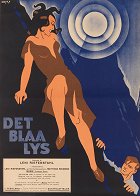Tartalmak(1)
Az immár fél évszázada elhunyt Balázs Béla írt forgatókönyvet a film főszerepét játszó Leni Riefenstahl rendezői debütálásához, mely alcíme szerint "Hegyi legenda a Dolomitok világából" és ez által az Arnold Fanck kezdeményezte ún. hegyi filmek csoportjába sorolható. A legenda szerint holdtöltekor mindig kék fény gyúl ki a hegycsúcson, ahova csak egy boszorkánynak tartott, furcsa vadóc lány, Junta képes felmászni. A nyomába eredő festő azonban kideríti, hogy a különös látomás oka a fény visszaverődése a kvarckristályokon, melyeket a mohó falusiak megpróbáltak elrabolni, amivel végül Junta halálát okozzák. A film igazi élményét azonban nem ez a mese hordozza, hanem a természet látványvilága: az erdők, a hegyek, a felhők, a fény és az árnyék, és persze a helybéli emberek a maguk nem kevésbé érdekes fiziomóniájával és mimikájával. Így jut el a néző a szereplőkkel együtt a természet misztikus szépségének felfedezéséhez. (Örökmozgó)
(több)Recenziók (1)
Stereolab: However, The Blue Light is one of the best sound films of the Weimar era, and the fact that Leni Riefenstahl was part of many silent films is perhaps also well known... so why speculate on whether she was inspired? She was the top female performer in mountain films, a genre she did not abandon even in sound film. Thanks to the success of such films, she was then able to produce The Blue Light herself because she was financially independent. Yes, she had offers from Hollywood, and Joe von Sternberg even considered casting her as the antithesis of the new Marlene... but as many experiences have shown, there was no clear choice for Europeans in the early years of sound film between Hollywood and Babelsberg. Marlene herself literally suffered from separation and loss of her roots, and the completely different work method in the early years. In the end, sound film buried the transnationalism, and back then a lot of people were coming back. How the political situation changed shortly thereafter is another matter and no one was omniscient.
()

